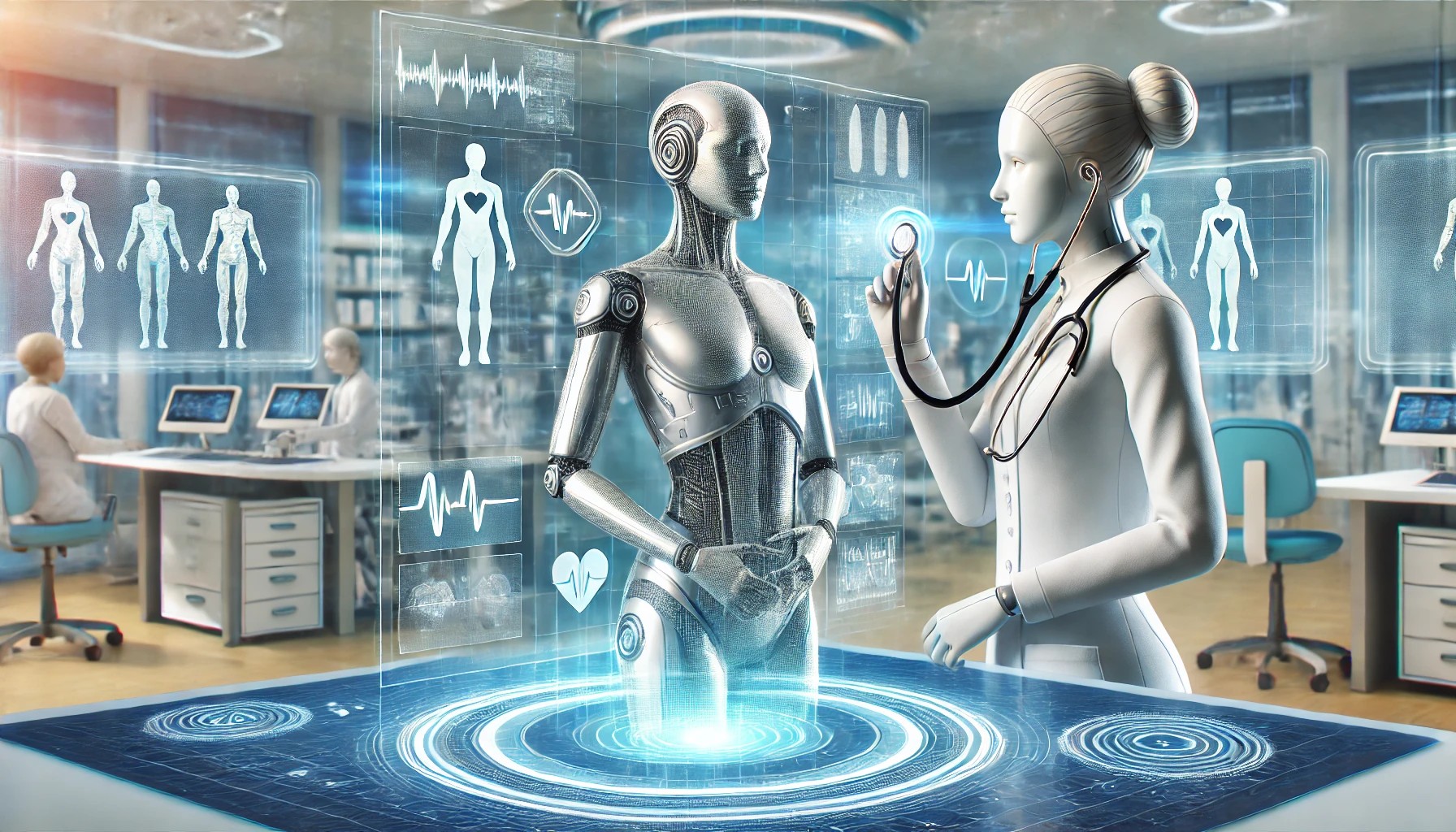May 2024
Introduction
Artificial Intelligence (AI) is reshaping healthcare, bringing innovations that improve patient care, streamline operations, and reduce costs. In 2024, AI's impact on healthcare will only deepen as technologies like predictive analytics, robotic surgery, and AI-driven diagnostics become more widespread. But what does this mean for businesses, especially those outside of the healthcare sector? In this blog, we’ll explore the future of AI in healthcare and its implications for businesses, from tech startups to corporate giants.
1. AI in Diagnostics: Enhancing Accuracy and Speed
AI has already made significant strides in medical diagnostics, and its influence is expected to grow in 2024. AI-powered diagnostic tools can analyze medical images, detect abnormalities, and suggest diagnoses faster and with higher accuracy than many traditional methods. Companies like Google’s DeepMind and PathAI are leading this transformation, with AI models designed to detect conditions such as cancer, heart disease, and neurological disorders from medical scans.
For businesses, this creates opportunities in sectors like medical devices, cloud computing, and AI development. As hospitals and clinics increasingly adopt AI diagnostics, there will be a surge in demand for companies offering AI-based solutions and cloud platforms to store and process massive amounts of healthcare data.
2. Personalized Medicine: AI-Driven Treatment Plans
Personalized medicine, driven by AI, is revolutionizing how doctors create treatment plans for patients. Instead of the traditional one-size-fits-all approach, AI can analyze an individual’s genetic makeup, lifestyle, and medical history to recommend tailored treatments. In 2024, AI’s role in this space is expected to expand as technologies like machine learning and data analytics help physicians make better-informed decisions.
For businesses, the implications are vast. Pharmaceutical companies are increasingly leveraging AI to speed up drug discovery and design personalized therapies. Non-healthcare companies, especially those in data analytics, can also benefit by partnering with healthcare providers to offer AI-powered solutions for personalized treatment planning.
3. AI in Medical Imaging: The Future of Radiology
Radiology has been one of the key areas where AI has demonstrated its potential. AI models are now capable of analyzing medical images—from X-rays to MRIs—much faster and more accurately than human radiologists in some cases. By 2024, the use of AI in medical imaging will likely become even more prevalent, reducing diagnostic errors and improving patient outcomes.
For businesses, this opens the door to partnerships with hospitals and medical imaging centers. Companies specializing in AI software development, data storage, or medical imaging hardware are poised to capitalize on this trend as AI-integrated systems become the industry standard.
4. Robotic Surgery: AI-Driven Precision
AI-powered robotic surgery has been making headlines for its ability to enhance precision and reduce recovery times. Tools like da Vinci surgical systems use AI to assist surgeons during minimally invasive procedures, improving accuracy and reducing the margin for error. In 2024, expect to see AI’s role in surgery grow as new innovations emerge, offering solutions for more complex procedures and broader use in hospitals worldwide.
The growing adoption of AI-driven surgery has implications for companies involved in robotics, AI development, and medical equipment manufacturing. As hospitals invest in these technologies, businesses that supply the necessary hardware, software, or AI systems will see significant growth opportunities.
5. Implications for Non-Healthcare Businesses
While AI is revolutionizing healthcare, its implications extend far beyond hospitals and clinics. For tech companies, AI’s expansion in healthcare offers new avenues for innovation, such as developing AI-powered tools for diagnostics, patient monitoring, and healthcare administration.
For businesses in sectors like insurance and finance, AI’s advancements in healthcare will likely drive changes in risk assessment, policy creation, and customer service. Insurers, for example, can use AI-driven data analysis to offer more accurate premiums based on real-time health data from AI-powered medical devices.
Moreover, as healthcare AI adoption grows, data privacy and security will become even more critical. This presents opportunities for cybersecurity companies to develop solutions that ensure the safe handling of sensitive medical data in compliance with healthcare regulations like HIPAA and GDPR.
Quiz: How AI is Shaping the Future of Healthcare
What role does AI play in medical diagnostics? A. It replaces doctors
B. It analyzes medical images and suggests diagnoses
C. It manufactures medical devices
D. It helps hospitals reduce energy costs
Which industry is likely to benefit the most from AI-driven personalized medicine? A. Pharmaceutical companies
B. Construction
C. Education
D. Hospitality
How is AI influencing robotic surgery? A. By performing surgeries independently
B. By assisting surgeons in improving precision and reducing errors
C. By designing new surgical instruments
D. By creating surgical textbooks
Email your answers to info@vistagan.com for a chance to win a free T-Shirt! Contest closes at the end of the month.
Conclusion
AI’s transformative power in healthcare is undeniable, and its impact will only grow in 2024. From diagnostics and personalized medicine to robotic surgery and beyond, AI is revolutionizing the way healthcare is delivered. For businesses, whether in healthcare or adjacent industries, this presents a wealth of opportunities to innovate, partner, and grow in this rapidly evolving landscape.
Is your business ready to take advantage of AI's innovations in healthcare? Contact us today at www.vistagan.com for a consultation and discover how AI can help you stay ahead of the curve.


